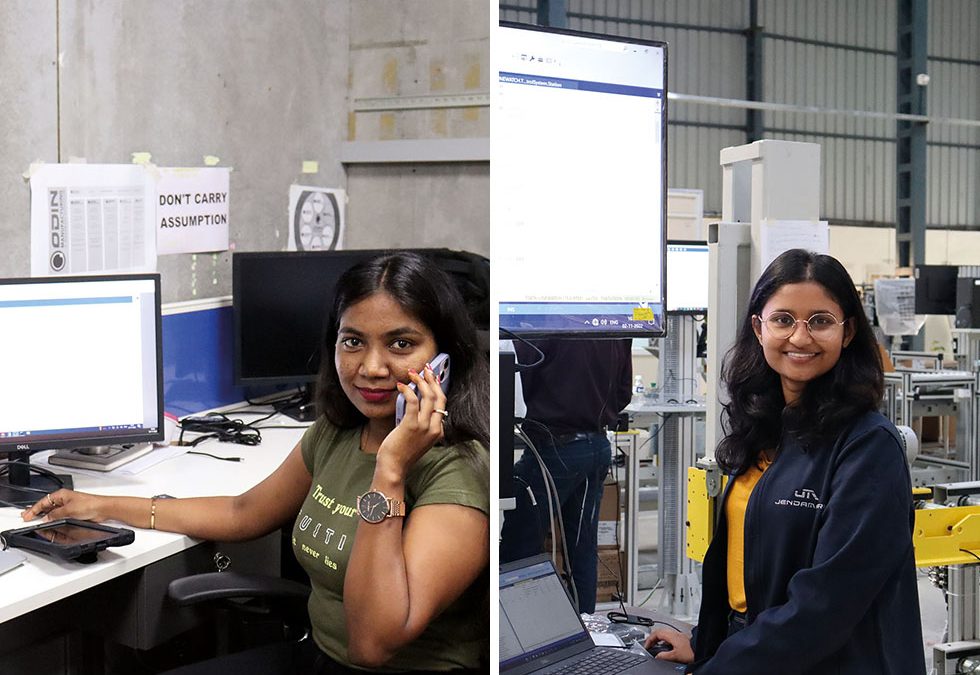
by NewsAdmin | Jan 23, 2023 | Jendamark News
Two of Jendamark India’s software developers, Monali Chalwadikar and Pratiksha Sawalakhe, answer some tough questions about the challenges and opportunities for women in the tech industry.
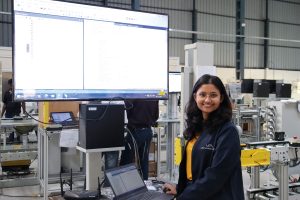
Pratiksha Sawalakhe
Q: Did you always know that working in technology was what you wanted to do?
MC: Honestly, I wanted to be a gynaecologist! Since I couldn’t get a merit seat in college, I opted for engineering. In saying so, I am very much into technology, so I am happy anyway. I have a phobia of electrical wires, so electrical engineering was definitely not an option. I had lot of interest in coding, so I chose computer science.
PS: No, I wanted to become a physiotherapist but because of a lack of knowledge and miscommunication about that field, I was not able to take admission. I did get admission to computer science engineering. Deep down, I knew that I had an interest in technical stuff. When I was about to take the admission for my 11th standard, I had to choose one optional subject, so I chose IT and then I got interested in technology. I used to create small websites and found it very interesting, so I decided to go into computer science.
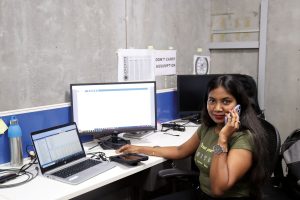
Monali Chalwadikar
Q: It’s no secret that many women in the tech industry have felt their gender has affected the way that they are perceived or treated. Have you ever been in a situation like that? How did you handle it?
MC: Being a woman is one of the proudest things I can ever experience as a person. Though it sometimes has disadvantages in terms of the treatment or limitations we face because of society and culture. According to my experience so far in the tech industry, I have faced a situation where I have had to adjust or negotiate with regard to a certain privilege and facilities. Sometimes the male ego and insecurities, and lack of belief in my capabilities, also become a very big challenge. I have faced all the situations by having the right attitude, ignoring a condition which doesn’t add value to my personal and professional growth, and by proving myself with all my hard work. Nothing can stop a woman who really has the right attitude and dreams to achieve.
PS: No, I have never been in that situation.
Q: What do you think is the best part of being a woman in the tech industry?
MC: It doesn’t make any difference to me. Being a woman will not give you extra benefits or special treatment. I have achieved everything by proving myself and through all my hard work and right attitude.
PS: The best part as a woman in the tech industry is that you will get to improve your technical skills and personality. And you will never stop learning.
Q: Do you notice a lack of women in technology? If so, why do you think that’s the case?
MC: Yes. Because of lack of family support and sometimes because parents feel that it’s unsafe to support their daughters to leave their city and allow them to live on their own.
PS: Yes, I did notice a lack of women in technology. I think organisations should initiate recruiting more women employees and give them the chance to prove themselves. We need more women who are willing to take on leadership positions. We live in a profoundly connected and global world, and companies that are more diverse will achieve better performance. But my experience tells me that time will not solve the gender leadership gap.
Q: What advice would you give a woman considering a career in the tech industry? What do you wish you had known?
MC: The right guidance and taking opportunities – no matter how small or big the opportunity is. I wish I would have received the right guidance and internships at the right time, which would have helped me grow my knowledge of working as a techy at organisational level in the early phase of my career.
PS: My advice to any woman would be never to miss any opportunity, no matter whether you are in college or an organisation. Just make sure you do your best because small opportunities can make a big difference and it will give you the experience that will definitely take you further.
Q: You’ve both described yourselves as introverts, and even wrote about how to network as an introvert. What is the most difficult thing about being an introvert in the tech industry? How have you overcome it?
MC: When I joined Jendamark India as a fresher, I was an underconfident woman though I had full faith in my abilities. Being an introvert, initially I was struggling to take help from the right connections, and, because of that, I used to get stressed out about not being able to complete a task on time. Then I worked to change into a talkative person, who started communicating with the right people, doing customer presentations, travelling alone, dealing with customers, and late-night, on-site work with seniors. This really helped grow my confidence.
PS: As a Jendamark employee, you get to explore and learn new things. As an introvert, I felt very shy to contact a person I didn’t know, but in my role, I have to speak to people from other departments too. My colleagues help me a lot in becoming a bit more extroverted.
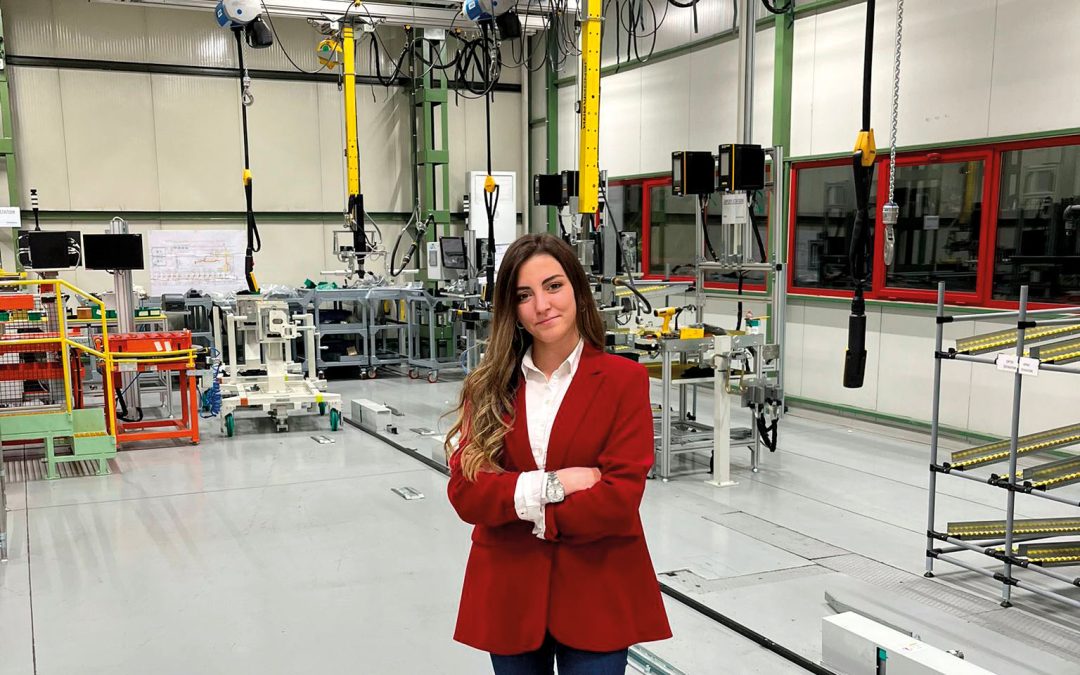
by NewsAdmin | Jan 10, 2023 | Jendamark News
Turkish manufacturer Erkunt Traktör A.Ş. recently entered into a joint venture to build engines for Mahindra. It is the first time that these engines are being assembled outside India, on an assembly line developed by Jendamark India. Erkunt’s PLC automation engineer, Tuğçe Karakuş, explains how ODIN Manufacturing contributed to the project’s success.
Q: Which ODIN Manufacturing solutions were used on the engine assembly line?
A: We used ODIN Workstation, ODIN Maintenance, ODIN Documentation and ODIN Linewatch.
Q: The Mahindra engine is usually assembled in India. Did the use of the ODIN system play a big part in enabling the transfer of this local knowledge and skills to Turkey?
A: Normally, Mahindra engines were assembled in India and then sent to Erkunt Traktör. With the ODIN system, we can now successfully perform this assembly process in Turkey. ODIN Workstation takes our operators through the process step by step: which bolts we need to tighten, with how many torques, and not to forget important details, such as completing the fine measurements and all the necessary tests. The ODIN system ensures the correct completion of the engine assembly. The first engine we completed in Turkey with the ODIN system worked successfully and there were no major problems.
Q: Was the Mahindra engine assembly line the first experience that the Erkunt facility had in building engines?
A: Yes, it was the first experience in engine assembly at the Erkunt facility and we are very proud of it.
Q: How did having animated work instructions, which were translated into Turkish, give your operators confidence and make a difference to the whole assembly process?
A: The fact that the work instructions were strengthened with visuals and presented in Turkish was very useful because it was simple and easy for operators to understand. It has eliminated any confusion during assembly, allowing the operator to do their job more comfortably and ensure complete engine installation without forgetting the steps.
Q: Were there any challenges with the assembly process and how did the ODIN system contribute to solving them?
A: The ODIN system facilitates many operational steps. For example, when tightening more than one bolt, it ensures that each bolt is tightened to the correct torque and the bolt is not skipped. The operator must complete all operations in the correct order; by following the barcode, the system does not allow them to skip a step or station. Obviously, all the difficulties decrease to the minimum level if the ODIN system is followed correctly.
Q: Your customer, Mahindra, could log in to the system and monitor in real-time how the production process was going. How did having access to this data contribute to a transparent and good working relationship between Erkunt and Mahindra?
A: The detailed report provided by the ODIN system is the best solution for us to be able to see all the steps that the engine went through during assembly, and all the data from when the process started to when it finished. It informs us in a simple and transparent way, giving us the details of the assembled engine, and what is happening on the line.
Q: We understand that you were hired specifically to take care of the ODIN system. Tell us a bit about your role and your experience on this project.
A: I’m a PLC automation engineer in the Erkunt team on this project. My role is to ensure that the ODIN system and PLC always work correctly and completely. I am working on the necessary controls, maintenance and troubleshooting on the line. I ensure that a new operation is defined in the ODIN system, that operations are kept up-to-date and always live without ever disconnecting. It’s been a truly enjoyable experience. I am very happy to work with the Jendamark team. When the ODIN Manufacturing system was implemented, the Jendamark team always worked with smiling faces and never hid their knowledge.
Q: Anything else you would like to add?
A: I am very proud that the Erkunt Tractor, Jendamark and Mahindra teams came together for such a big project and worked as a team. As the female engineer on the team, I would like to thank my managers Mehmet Temucin and Ahmet Cenk Çivici for always supporting them and my teammate Utku Söyünmez for managing this process with me. I would like to thank the entire Erkunt team for their efforts and contributions. I would also like to thank Kumarshiv Himandi and Suslove Biswas from the Mahindra team for coming to Turkey to support and help us. From Jendamark, I would like to thank Himanshu Jadhav and the whole team.
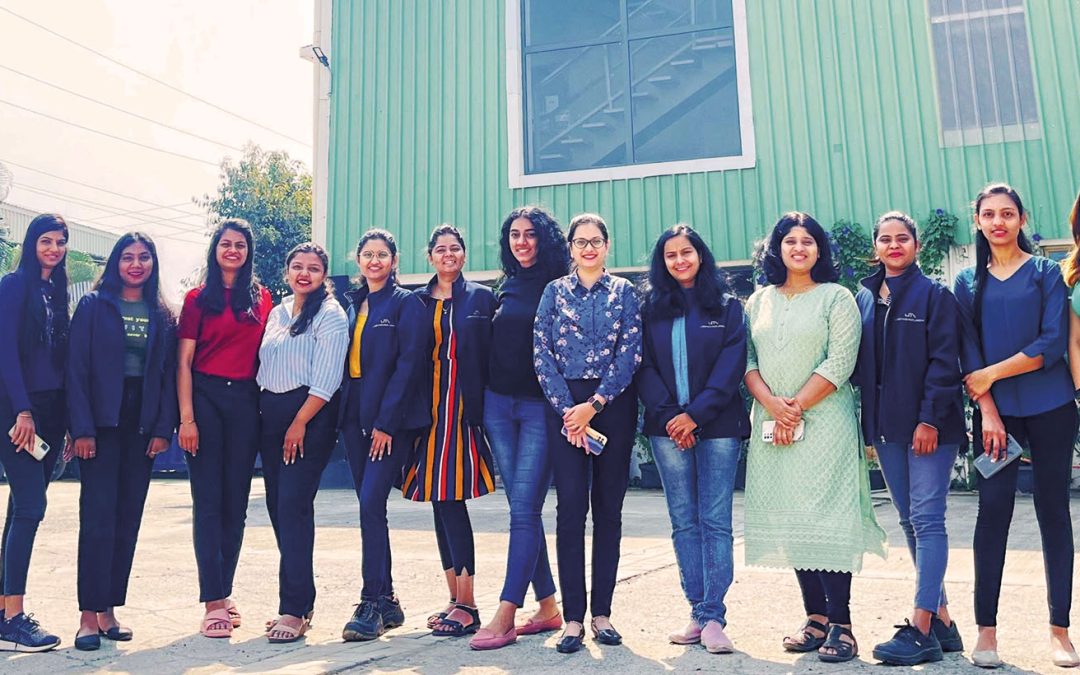
by NewsAdmin | Dec 12, 2022 | Jendamark News
Globally, the manufacturing sector is still male-dominated, and many companies struggle to attract skilled female candidates. But with digital technologies creating previously undreamed-of job possibilities, Jendamark is working hard to redress the gender imbalance.
The management teams in both India and South Africa have set clear targets to develop a diverse and inclusive workforce across all departments.
“In a perfect world, we would want a 50:50 ratio,” says Jendamark Automation human resources manager Mariette Geldenhuys.
“But we are hopeful that with the intake of more women through our skills development programmes, such as apprenticeships, we are actively working towards closing the gender gap, especially in the traditionally ‘male’ technical roles.”
The big picture
At Jendamark India, where women currently represent 7% of the workforce, the company has set an ambitious target of doubling this in the 2023 financial year. The aim is to employ at least one or two women in every department. “The advantages of having women in the workforce are manifold,” says JMKI’s head of HR, Pallavi Chavan.
“On a micro level, working women become financially independent and will have greater control over their own lives. This encourages women to stand against physical and emotional abuse, enabling them to handle social issues and pressures. At the macro level, greater participation of women in the workforce is good for the overall economy.”
In South Africa, women are one of the under-represented minority groups covered by the Employment Equity Act.
“In terms of affirmative action, we absolutely want to contribute to the success of various policies in this regard, but our aim is always to be an equal opportunity employer and appointments will be made according to experience and merit,” explains Geldenhuys, adding that female representation has grown from 16.9% to 24% in just two years.
Digital transformation
Both Chavan and Geldenhuys agree that the rise of Industry 4.0 technologies is transforming and creating new opportunities in the manufacturing space.
“In terms of innovation, women are adding great value, but a lot can be done to encourage young girls to enter into the fields of ICT, science and technology, which will enable them to apply for the various types of jobs that will inevitably be created by 4IR trends,” says Geldenhuys.
“It will become society’s duty to empower girls to be able to pursue these careers, specifically those in rural areas where access to technology is near non-existent.”
Employer of choice
According to the human resources professionals, diversity is becoming a strategic imperative for organisations looking to build a sustainable future. Women tend to bring a different dynamic to the workplace, with collaborative management styles and multi-tasking abilities, which fosters more balanced, motivated, and creative teams, helping the business to grow to its full potential.
“But this requires change from the top and, in Jendamark’s case, this change is being driven from exactly there. Being able to offer flexibility and a positive work-life balance by incorporating various policies and incentives will make a difference in attracting and retaining these skills,” Geldenhuys says.
Both agree that Jendamark’s flexible work-from-home policy, maternity leave benefits and empowerment programmes, such as self-defence training, are making a difference.
“Ultimately, our aim, when it comes to both male and female employees, is to be the employer of choice,” affirms Chavan.
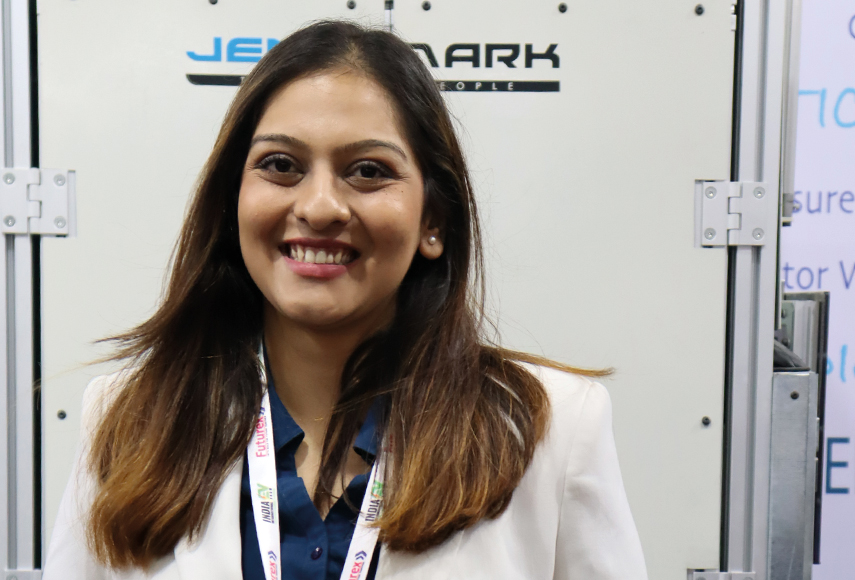
by NewsAdmin | Dec 9, 2022 | Jendamark News
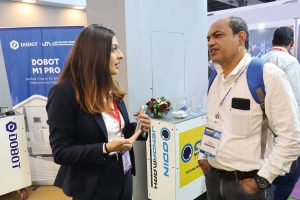 From starting as key account manager for a previously unknown core business to setting up the whole Jendamark India marketing division, Sayali Mahajan’s career journey has certainly been a challenging one.
From starting as key account manager for a previously unknown core business to setting up the whole Jendamark India marketing division, Sayali Mahajan’s career journey has certainly been a challenging one.
“Five years ago, I started my journey with Jendamark as a key account manager for catalytic converter assembly lines. The canning business was very new to India and nobody really had much of an idea of how it worked and what it takes to install a canning line. It was very challenging and exciting to go through the process. I also worked as a project manager for the first ever canning line delivered by Jendamark India.
Being a woman working in a hardcore manufacturing industry can be a bit tricky. Many times people tend not to take you seriously. We always have to put in extra efforts to prove ourselves and make our opinion or work valued. Personally, I have never felt that I am less than any man when it comes to my work as I have the knowledge of the products I am selling. I am also willing to learn and get better at it. I love my job and all the challenges that come along with it.
After my maternity leave, I was promoted within two months to head of marketing for Jendamark and all other associated business verticals, including ODIN Manufacturing, ODIN Education, eepos and Dobot. Before I came into the picture, there was no dedicated marketing person or team. Marketing activities were ad hoc but the rapid growth of our business has meant that leveraging the Jendamark brand has become a key function within the company.
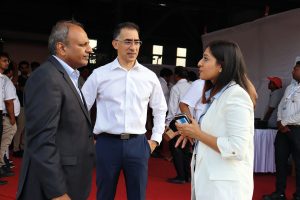
It was a great experience building a team and creating marketing strategies for all the different business verticals as we knew we couldn’t have the same strategy for all.
I was adamant on hiring all women in my team. I am extremely proud of the fact that my entire marketing team is female. We are a ‘Girl Gang’.
Unfortunately, there is this mistaken impression, which many people have, that girls have it easy or we have to make less of an effort in our jobs. But the reality is that we are expected to deliver the same results as that of any male employee and even put in extra effort to get there as we have to take care of our work, our children and our families too.
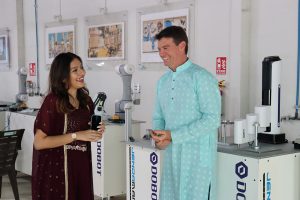 After having my baby, I thought it would be a bit difficult for me to manage work and my child, as I have to travel a lot for my job. But flexible working hours and work-from-home facilities made it easier. My child is also very accommodating and co-operative. My baby is my biggest cheerleader.
After having my baby, I thought it would be a bit difficult for me to manage work and my child, as I have to travel a lot for my job. But flexible working hours and work-from-home facilities made it easier. My child is also very accommodating and co-operative. My baby is my biggest cheerleader.
My Jendamark journey has been an amazing rollercoaster ride. I have learned a lot, made use of all the different opportunities I’ve been given, and gotten to do so many new things. I am sure my next five years will be as exciting as the last five years.”
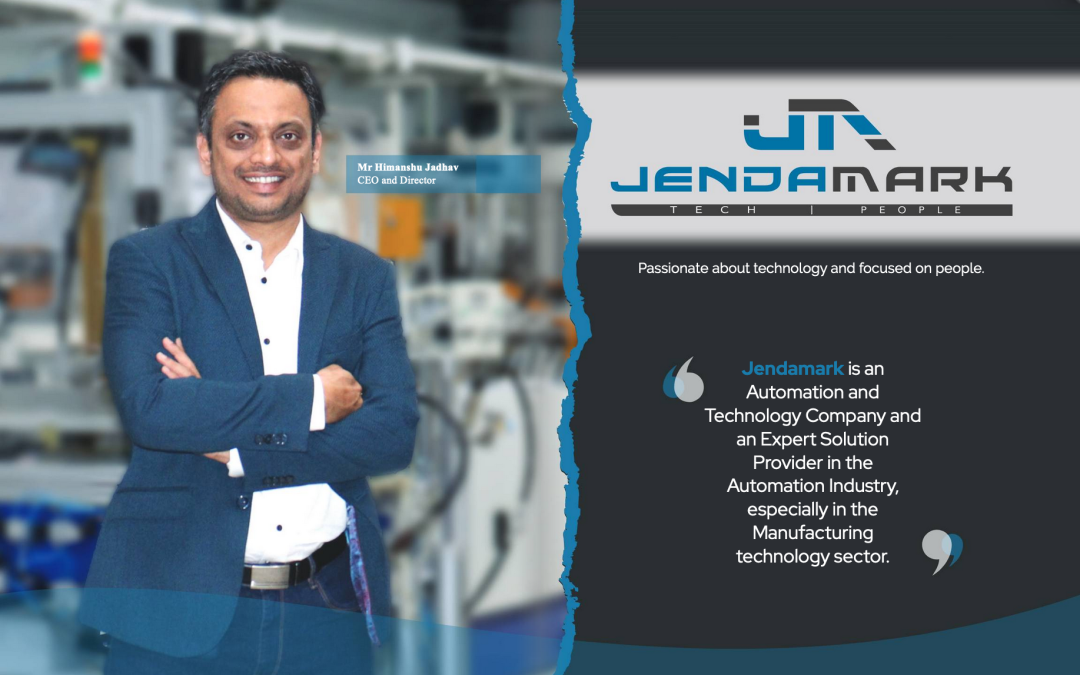
by NewsAdmin | Nov 30, 2022 | Jendamark News
The modernistic sensation of Industry 4.0 is riding on the phenomenon of the digital revolution. It fuses technological intelligence and advancements with human smartness, erasing the boundaries between physical, biological, and digital realms.
Click here to see the original CIO Look India magazine feature.
The industries in the world are completely enamoured by this awe-inspiring necessity, trying to adopt it in their own ecosystem. Moreover, the manufacturing industry is very eager to embrace all the automation technologies offered on a significant benchmark. As many industry experts around the globe feel that the Industrial Automation is an advanced maze of futuristic technologies–at the same time–adopting it is a very intricate, elaborated, and time-money-efforts-driven process.
This is why industries, especially the manufacturing ones, urgently need the professional expertise of a specialist like Jendamark India Pvt Ltd, which has mapped a clear path through the technological maze of the fourth Industrial Revolution to take customers into the future of automotive manufacturing.
South African-based Jendamark Automation has been working with European countries for a long-time while ensuring knowledge sharing of this expertise, as well as the latest Industry 4.0 technologies, to Jendamark India. The company’s vision is to be a leader in manufacturing technologies that helps its customers work smarter and build a better world for all.
In the expert words of Mr Himanshu Jadhav, the CEO and Director of Jendamark, “We have adopted a nine-pillar definition of Industry 4.0 to guide the way. Based on this definition, we have established a strategy to achieve these nine points.”
Jendamark is currently developing the first eight pillars:
Integrated Systems Predictive Maintenance Additive Manufacturing Augmented Reality Internet of Things Simulation Autonomous Robots The Platform
Jendamark is an Automation and Technology company having its headquarters in Port Elizabeth, South Africa. Globally it has a presence in India, the US, and Germany. Jendamark is the Expert Solution Provider in the Automation Industry, especially in the Manufacturing technology sector. In India, it provides solutions in five business verticals,
- Powertrains Assembly: Jendamark specialises in automotive powertrain assembly, which include engine, axle, transmission, and differential assembly lines from completely manual to fully automated systems.
- Catalytic Converter Assembly Lines: Jendamark’s adaptive canning facilities accommodate the most complex assembly requirements to meet BS6 exhaust emissions norms.
- Electric Vehicle Assembly Lines: Jendamark designs and manufactures battery packs, motor lines, e-transmission, e-axles, and power electronics assembly systems for the electric vehicle market.
- Aerospace Tooling: Jendamark India provides high-quality products to leading manufacturers in the aerospace industry.
- Digital Services: Himanshu explains that in the company’s Digital Services the CORE is human Centric approach towards Industry 4.0, this is what sets Jendamark apart from the rest of its competitors. Himanshu shares that at Jendamark, they believe in making the operators more efficient than just the machine more efficient.
They also believe that one of the most important driving factors for increasing productivity and efficiency in developing countries is not machines but the operators who work on and with those machines. This is the foundation of the ODIN Eco-system which is Jendamark’s solution for the manufacturing sector looking to foray into the I4.0 world.
They are incredibly passionate about technology and keenly focused on people. They provide their customers with solutions with the latest innovative technology at cost-effective pricing.
Himanshu reveals, “We were the pioneers in setting up the electric vehicle assembly lines way back in 2017-18.
Also, currently, we are the only company in India which has the know-how and has delivered the Catalytic Converter Assembly Lines. We are very proud of being one of the only three suppliers in India selected by Boeing for the defence programmes and for sure one of the only automation companies which also has its own developed dedicated digital service software to improve the efficiency of manufacturing lines. All in all, as you can see, we operate in quite challenging areas and, at the same time, it gives us the chance to be innovative. That’s our DNA.”
The Dynamic Leader Par Exemplar
Being the CEO and Director of Jendamark, Himanshu has almost 18 years of successful experience providing strategic, fiscal and operations leadership in uniquely challenging situations. He is a dynamic, result-oriented leader with a strong track record of performance in turnaround and high-paced organisations.
Speaking about the Fourth Industrial Revolution, Himanshu reveals that he heard about Industry 4.0 back in 2015-16 and felt that it is too early for companies in the Indian manufacturing system to adopt what has been worked out in the Western World. He and his colleagues at Jendamark quickly realised that the solutions offered in the western world would not fit as it is in the Indian market.
Himanshu explains that there are several reasons which are the main key differentiators between India and the rest of the world. One of the main differences is the huge population and the effects that a huge population has on the Social fabric, Economics, and Industry in general.
So, they agreed within their Board that they must have a Holistic approach, and after a lot of discussion and debate, they formalised a strategy for Industry 4.0 which was not machine-centric but human-centric.
The core objective was to improve the efficiency of the operators and the humans who actually operate those machines. Not just on the shop floor but also on the whole project cycle, they develop tools and solutions that enhance efficiency and productivity throughout the project life cycle. For example, in the design phase, the use of Virtual Reality and Augmented Reality tools.
The Human Foundation of Technovations
Himanshu adds, “To be honest, what sets us apart is not only our technical solutions but certain fundamentals with which we operate our business and what we strongly believe in. What differentiates us are the below five important aspects of our business.
People: We value Passion
Though we are a tech company, we value the spirit of our people more than their technical knowledge. Passion and tenacity are fundamental to every individual in our team, regardless of their role. With the right mindset, we can tackle any technical, commercial or customer challenge. We have proved this year after year in a global market.
Commitment: We never walk away. As a tech company that is constantly pushing new frontiers, we sometimes make mistakes. But no matter how painful the consequences, we always, always finish what we started. We remain humble enough to ask for help, whether from a supplier or customer. However, we take responsibility for our commitment – and we never walk away.,
Truth: In our actions, We believe in being honest in our ideas and, most importantly, our actions. It always leads to a positive outcome in the long run. Being candid with ourselves, customers and partners are challenging. But this has proven to be the bedrock of a great relationship. We strive to honour the truth – it is the responsible thing to do and leads to business success for all.
Future–Centric: Remaining relevant to our partners, securing our futures. We are always looking to the future. The relevance of our company to our customers/partners is of utmost importance; although proud of our achievements, we continually push new boundaries garnering strength from our successes and converted failures. We continually seek opportunities to improve for our suppliers, customers, and ourselves.
Community: Ubuntu – Humanity towards others. We remember where we come from. We are successful because of the community around us and have a responsibility to help those less fortunate in return. We do so with pride and passion. Ubuntu is an African philosophy of “humanity towards others,” which is sometimes translated as “I am because we are.” We take Ubuntu to heart.
The above driving principles drive us to deliver precise solutions to our customers.” Solving the Riddle of Industry 4.0 through AI and ML Being an experienced leader, Himanshu’s opinions on how adopting modern technologies like AI and ML impacts Industry 4.0 and how Jendamark is adapting to the change are crystal clear.
He reflects that the adoption of modern technologies like AI and ML has always been anticipated. In effect, they at Jendamark have been looking forward to identifying the right area where these can be deployed. With their strategy now, they are very clear that AI will definitely be a lot more useful in their context in Industry to make decisions which are repetitive in nature and can actually cause boredom to any operator.
Such decisions are difficult not because of the intelligence involved but because of their repetitive nature. It is possible that an employee can overlook or can have oversight in such areas.
This can lead to serious quality or safety issues. A similar thing goes with machine learning as well. To adapt to these new technologies, they already have a strong development team in India and South Africa. They are continuously working to identify, develop and integrate AI and ML in their existing machines and also develop new machine equipment solutions where the use of these technologies is further enhanced.
“We also feel that the use of AI and ML should not be just limited to equipment and machines, but it should be possible to bring these modern technologies into day-to-day business practices, which will make the decision-making process more evolved and educated, causing fewer errors,” believes Himanshu.
Learning Ventured Marching over Obstacles Considering the current industry scenario, Himanshu accepts that challenges are numerous, but they at Jendamark look at all challenges as opportunities. The real challenge, he strongly believes, in the near future will be the availability and retention of the right talent required to drive their goals and targets forward.
As a technology-oriented company, the team constantly challenges itself to create new solutions and be innovative. “For this, we are always looking for the right kind of personnel, engineers, and solution providers to work with us. The huge explosions of opportunities and in relation to those opportunities, the availability of the right skills to work in these challenging situations is what I feel is going to be a difficult challenge,” shares Himanshu.
To overcome these, they at Jendamark have already started their actions by having long-term agreements and associations with Universities across India. The idea is not just to have the agreement for getting access to their young Engineers but to prepare the students before they leave the colleges with what the company and industry expect.
Himanshu states, “The examples of this can be seen in our work which we are doing with MIT World Peace University and D.Y. Patil College of Engineering where our team has given Cobots, machines, Industry 4.0 solutions, and Cloud computing systems to the students.”
Jendamark not only just provide these hardware and software but also conducts various seminars and webinars in these colleges to explain to students the usage of these.
“This way, we feel that we will have a very strong Industrial academia connection to overcome the challenge of the right resource required for our Industry,” expresses Himanshu.
India on the Path to Complete Industry 4.0 Adoption When probed about when the Indian Industry will ultimately adopt the Fourth Revolution, Himanshu thinks that we first need to change the definition and understanding of what the Fourth Industrial revolution is with respect to India. “Because if you go on Google and try to learn about Industry 4.0, you might really get confused. Is it really for me? Is it going to help me? Is it worth it?
Such questions will arise in your mind,” says Himanshu.
Since it’s quite challenging to understand what does it really means. As there is too much information and too little actually to define as how to adopt it. So, in his opinion, first, there needs to be a modification in people’s understanding of the Fourth Industrial Revolution.
He believes, “The adoption in totality will actually take a lot of time, but I think the process has already started. In fact, the adoption, in my opinion, got fast-tracked with COVID, and it worked as a catalyst to push the industry towards the first step of the fourth Industrial revolution, which is digital transformation.”
The first simple step in digital transformation is moving from paper-based to digital processes. Use simple and essential digital transformation tools, and once that is done in parallel, the industry is moving towards the Fourth
Industry Revolution. Himanshu is quite confident that in the next four-five years’ the industry will see mass adoption of the Fourth Industrial Revolution, “But again once we define the right way of the Fourth Industry revolution as I said before in the Interview. Being human-centric and value-driven is the key,” says Himanshu.
Himanshu’s Wisdom of Tranquillity
“To all the budding entrepreneurs who want to enter into the venture of Industry 4.0, please, my sincere request is to identify what you really want to do and not aim or copy somebody else,” appeals Himanshu.
Second, be ready to fail and don’t get disappointed with the failures. He honestly shares that they, as a company, have had several projects kickstarted with a lot of enthusiasm.
He accepts, “We walked through them, and unfortunately, they didn’t work out and could not be put in the market.” But that never stopped them from trying to do the next best thing. And that’s what Himanshu advises everyone, “Do your own thing, do what you believe in your venture and be ready to fail, and even if you fail doesn’t matter. Get up and start doing what you think is the next best thing. Eventually, success will be yours.”
Future’s Holistic Techno Lords
Revealing his plans on scaling Jendamark India’s operations and offerings in 2022 and beyond, Himanshu says that they don’t want just to get bigger but better!!
Their thought process is scaling up in terms of not only numbers but scaling up in terms of value that they bring to their customers.
Himanshu adds, “Definitely, we are looking at more lateral growth and not just vertical growth. Lateral growth in terms of our offering in our technologies means we have already ventured into software; we have now done a foray into delivering Cobots. These we feel will bring our company ahead by virtue of having a one-stop solution for most of the industry’s needs.”
Himanshu further says that employees are Jendamark’s biggest strength, and they will be working extensively within their company with external partners and with the universities to scale their skills. Himanshu insists, “It’s essential for us that we develop the skills of our employees so that they can create future innovative solutions.”
“In terms of offerings, we see ourselves bringing in new innovative solutions. Also, new functionalities and products under our Odin Manufacturing Ecosystems. We will also launch Odin Education to bring education to underprivileged children,” promises Himanshu.






 From starting as key account manager for a previously unknown core business to setting up the whole Jendamark India marketing division, Sayali Mahajan’s career journey has certainly been a challenging one.
From starting as key account manager for a previously unknown core business to setting up the whole Jendamark India marketing division, Sayali Mahajan’s career journey has certainly been a challenging one.
 After having my baby, I thought it would be a bit difficult for me to manage work and my child, as I have to travel a lot for my job. But flexible working hours and work-from-home facilities made it easier. My child is also very accommodating and co-operative. My baby is my biggest cheerleader.
After having my baby, I thought it would be a bit difficult for me to manage work and my child, as I have to travel a lot for my job. But flexible working hours and work-from-home facilities made it easier. My child is also very accommodating and co-operative. My baby is my biggest cheerleader.